Acornsoft was the software arm of Acorn Computers, and a major publisher of software for the BBC Micro and Acorn Electron. As well as games, it also produced a large number of educational titles, extra computer languages and business and utility packages – these included word processor VIEW and the spreadsheet ViewSheet supplied on ROM and cartridge for the BBC Micro/Acorn Electron and included as standard in the BBC Master and Acorn Business Computer.
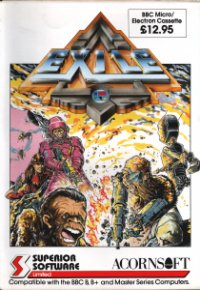
Exile is a single-player action-adventure video game originally published for the BBC Micro and Acorn Electron in 1988 by Superior Software and later ported to the Commodore 64, Amiga, CD32 and Atari ST, all published by Audiogenic. The game was designed and programmed by Peter Irvin and Jeremy Smith. It is often cited as one of the earliest examples of a Metroidvania game and featured "realistic gravity, inertia and object mass years before players understood the concept of a physics engine... an astounding level of AI, stealth-based gameplay, a logical ecosystem governing the world's creatures and a teleportation mechanic that feels startlingly like a predecessor to Portal".
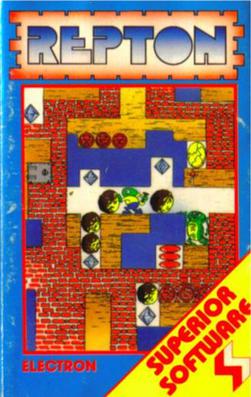
Repton is a video game originally developed by 16-year-old Briton Tim Tyler for the BBC Micro and Acorn Electron and released by Superior Software in 1985. The game spawned a series of follow up games which were released throughout the 1980s. The series sold around 125,000 copies between 1985 and 1990 with Repton 2 selling 35,000 itself. The games have since been remade for several modern systems, including iRepton for the iPhone / iPod Touch in 2010, and Android Repton 1, Android Repton 2 and Android Repton 3 from 2016 to 2018.

Superior Software Ltd is a video game publisher. It was one of the main publishers for the BBC Micro and Acorn Electron computers in the 1980s and early 1990s, and occasionally published software to the Commodore 64, Amiga, ZX Spectrum and Amstrad CPC. It currently releases games for Microsoft Windows, iOS and Android, mostly updates of its original games.

Citadel is a computer game developed by Michael Jakobsen for the BBC Micro, and released by Superior Software in 1985. It was also ported to the Acorn Electron. Centred around a castle, this platform game with some puzzle-solving elements requires players to find five hidden crystals and return them to their rightful place. It also features some outside areas external to the castle.
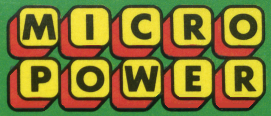
Micro Power was a British company established in the early 1980s by former accountant Bob Simpson. The company was best known as a video game publisher, originally under the name Program Power. It also sold many types of computer hardware and software through its Leeds 'showroom' or via mail order.
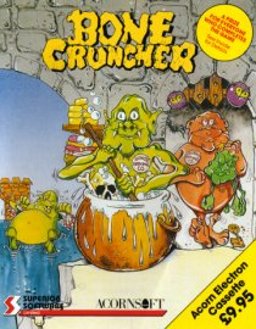
Bone Cruncher is a puzzle video game for the Acorn Electron, BBC Micro, and Commodore 64 first published by Superior Software in 1987. It uses the "rocks and diamonds" mechanics of Boulder Dash. An Amiga version was released in 1988.
Blue Ribbon was the budget computer software publishing label of CDS Micro Systems.

Spellbinder is an adventure game, released for the BBC Micro and Acorn Electron in 1987.
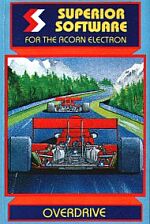
Overdrive is a racing game written by Peter Johnson for the Acorn Electron and BBC Micro and published in 1984 by Superior Software.

Pipeline is a video game for the BBC Micro and Acorn Electron, originally published by Superior Software in 1988. It is an overhead view action role-playing game set on a mining platform. It was remade for Microsoft Windows as Pipeline Plus (2004).

Elixir is a video game for the Acorn Electron and BBC Micro released in 1987 by Superior Software. It is a platform game in which the player takes the role of a shrunken scientist.

Cops 'n' Robbers is a video game published by Atlantis Software in 1985 for the VIC-20 and in virtually identical form on the Commodore 64. It was ported to the Commodore 16 and Commodore Plus/4 (1986), Acorn Electron and BBC Micro (1987), and the Atari 8-bit family (1988). The game was controversial when released as the player takes the role of a robber and must shoot the police.

Survivors is a game published by Atlantis Software in 1986 for the ZX Spectrum. It was ported to the MSX, Atari 8-bit family, Commodore 64, Commodore 16, Acorn Electron, and BBC Micro and the Amstrad CPC (1988). It is a puzzle game based on the "rocks and diamonds" mechanics of Boulder Dash.

Deathstar is multidirectional shooter for the Acorn Electron and BBC Micro developed by Peter Johnson and originally published in the UK by Superior Software in 1985. It is a clone of the arcade game Sinistar.
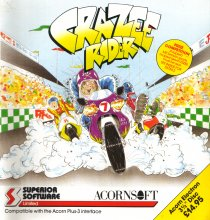
Crazee Rider is a motorbike racing video game created by Kevin Edwards and published by Superior Software in 1987. It was released for the Acorn Electron and BBC Micro with an enhanced version for the BBC Master. The game was particularly well received for the Electron as it was the first 3D racing game with corners for that machine.

Spycat: An Interactive Exposé of M.I.41⁄2 is an action-adventure game for the BBC Micro and Acorn Electron, written by Peter Scott and published by Superior Software in 1988. The game is a parody of the scandal surrounding the Spycatcher book.
Gordon J. Key authored video game software for the Acorn BBC Micro, Electron and RISC OS platforms in the 1980s and 1990s. His most well-known works were published by The Fourth Dimension. He is also credited with additional programming routines in FedNet's futuristic flight combat game Star Fighter 3000 (1994), and authored Party Machine for the Amstrad CPC.
















